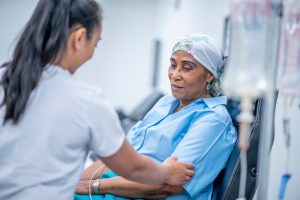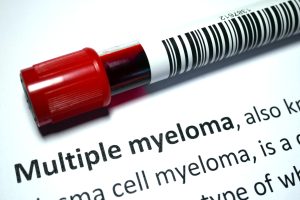
Myths and Reality of Chemotherapy Side Effects
Patients with cancer understandably may be apprehensive about chemotherapy because of its association with significant side effects. While it is true that some patients do
HIPAA Alert: Potential Data Breach Learn More
Questions on Oncology, Hematology and/or Infusion Clinical Services due to COVID-19 Crisis – CALL 833-698-1623
Important Information for Our Patients Regarding the Coronavirus.
RCCA Providing Area Cancer Patients with Access to Care During Coronavirus Outbreak
RCCA Offering Patients Virtual Visits During Coronavirus Pandemic
One of the most curable forms of cancer, testicular cancer occurs when abnormal cell growth starts in the testicles. These organs, which are contained in the scrotum sac located underneath the penis, are responsible for making male hormones and sperm. Understanding common testicular cancer symptoms is key to early detection and treatment. At Regional Cancer Care Associates, our team of compassionate and experienced oncologists provides patients in New Jersey, Connecticut, Massachusetts, and the Washington, D.C., area with diagnosis, staging, and treatment for testicular cancer.
By paying attention to any changes in the genital area, performing regular self-exams, and scheduling routine medical checkups, men are better able to detect testicular cancer symptoms and signs. Cancer can be found in one or both testicles and may spread to other parts of the body, including the lymph nodes and abdomen. Finding testicular cancer early increases the ability of the medical team to select from among more treatment options and achieve the best possible outcomes. Some of the more common symptoms and signs of testicular cancer include:
It is important to note that these symptoms may indicate causes other than cancer, such as inflammation resulting from a viral or bacterial infection, or a response to an injury. However, any testicular cancer symptoms should be evaluated promptly by a medical practitioner.

More than half of new cases of testicular cancer are in men between the ages of 20 and 40. However, men of all ages can be diagnosed with the disease. Medical research points to a few risk factors in addition to age, which include:
The evaluation of possible testicular cancer begins with a physical examination. Ultrasound imaging, blood tests, and other assessments may also aid in detection. Blood tests are performed to determine the presence of specific enzymes or proteins known as tumor markers, which can signify the presence of testicular cancer. They’re also used to determine the extent, or stage, of the cancer. Biopsy of testicular tissue may also be used, but is rarely a component of the diagnostic process. Usually, the diagnosis is made by other tests before the tissue is removed and sent for laboratory analysis to help determine the nature of the cancer.
If cancer is found, the medical team will likely order more tests, such as magnetic resonance imaging, computed tomography, positron emission tomography, and bone scans to determine whether cancer has spread to other parts of the body. If a patient already has received a diagnosis of testicular cancer, oncologists at Regional Cancer Care Associates are available for second opinions to confirm the diagnosis or recommend a treatment plan.
Treatment approaches for testicular cancer are individualized based on the nature and extent of the cancer, the patient’s overall health, and other factors. If the cancer is slow growing and has not spread beyond one testicular, an oncologist may recommend surveillance with periodic examinations, blood tests, and imaging studies rather than surgical or other intervention. When treatment is indicated, however, the main options are:
There may be side effects to using radiation therapy and chemotherapy to treat testicular cancer, including nausea, fatigue, and reduced fertility. However, the expert medical teams at Regional Cancer Care Associates are available to help patients with side effects management.
Researchers and clinicians also are evaluating the role of immunotherapy, which harnesses the power of the body’s immune system to fight cancer, in the treatment of certain types of testicular cancer.
A cancer diagnosis can be stressful. That’s why the compassionate and experienced oncology team at Regional Cancer Care Associates is prepared to discuss options and treatments, provide second opinions, and develop and implement personalized cancer treatment plans. Testicular cancer is usually curable. Men of all ages, especially those between 20 and 40, should watch for symptoms. If testicular cancer is detected, our medical team can help. Contact us or schedule a consultation at one of our 25 convenient office locations in New Jersey, Connecticut, Massachusetts, and the Washington, D.C., area.
Regional Cancer Care Associates (RCCA) offers high-quality, comprehensive and advanced treatment close to home. At RCCA, you’ll be treated by experts who are part of one of the largest cancer care networks in the country. We focus on every patient, individually, and work with you and your family to make sure your care is second to none.
For more information, or to schedule an appointment, call (844) 346-7222. You can also schedule an appointment by calling the RCCA location nearest you.

Patients with cancer understandably may be apprehensive about chemotherapy because of its association with significant side effects. While it is true that some patients do

Multiple myeloma (MM) is a rare type of blood cancer that often develops without early symptoms, making awareness of risk factors essential. Regional Cancer Care

Paulette Stallone thought that the nurses looked worried, and that worried her. “I said to my husband, ‘Something is very wrong; they all seem really
When standard cancer treatments aren’t providing the results you want, clinical trials may offer hope. Our physicians use clinical trials to study new treatments, helping transform cancer care for the better. You can enroll in a clinical trial to try groundbreaking treatment plans at zero cost to you.

Regional Cancer Care Associates is one of fewer than 200 medical practices in the country selected to participate in the Oncology Care Model (OCM); a recent Medicare initiative aimed at improving care coordination and access to and quality of care for Medicare beneficiaries undergoing chemotherapy treatment.